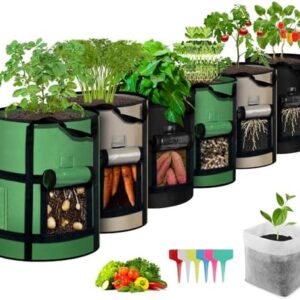Organic farming is gaining popularity as more and more consumers become aware of the harmful effects of conventional farming practices on human health and the environment. One key aspect of organic farming that sets it apart from conventional farming is the use of composting to improve soil health.
Composting is the process of decomposing organic material, such as kitchen scraps, yard waste, and manure, into a nutrient-rich soil amendment. By using compost in their fields, organic farmers are able to build healthy soil that is teeming with beneficial microorganisms, which in turn supports healthy plant growth.
One of the key benefits of using compost in organic farming is its ability to improve soil structure. Compost helps to create a soil that is well-aerated and well-drained, which is essential for healthy plant growth. Good soil structure allows plant roots to penetrate deeply into the soil, accessing nutrients and water more efficiently.
In addition to improving soil structure, compost also helps to improve soil fertility. Compost is rich in nutrients such as nitrogen, phosphorus, and potassium, which are essential for plant growth. By adding compost to their fields, organic farmers are able to provide their plants with a slow-release source of nutrients that can help them thrive throughout the growing season.
Compost also plays a key role in promoting soil health by supporting a diverse and thriving community of beneficial microorganisms. These microorganisms break down organic matter in the soil, releasing nutrients that are essential for plant growth. In addition, these microorganisms help to suppress harmful pathogens and pests, reducing the need for synthetic pesticides.
Using compost in organic farming also helps to reduce the need for synthetic fertilizers, which can be harmful to the environment. Synthetic fertilizers can leach into groundwater, polluting water sources and harming aquatic ecosystems. By using compost instead of synthetic fertilizers, organic farmers can reduce their impact on the environment and promote sustainable agriculture practices.
Composting is a key component of organic farming, but it is not without its challenges. Composting requires careful management of temperature, moisture, and aeration to ensure that the organic material breaks down efficiently and effectively. Organic farmers must also be mindful of sourcing organic materials for their compost to ensure that they are not introducing harmful chemicals or pesticides into their fields.
Despite these challenges, the benefits of composting in organic farming far outweigh the difficulties. By using compost to improve soil health, organic farmers are able to produce healthy, nutrient-dense crops without relying on synthetic fertilizers or pesticides. In addition, composting helps to reduce waste by recycling organic materials that might otherwise end up in landfills.
As consumers become more conscious of the origins of their food and the impact of conventional farming practices on the environment, the demand for organic produce is expected to continue to rise. By embracing composting and other sustainable farming practices, organic farmers are able to meet this growing demand while also promoting healthy soil, healthy plants, and a healthy planet. Organic farming practices, including composting, are the key to a more sustainable and environmentally-friendly agricultural system.






